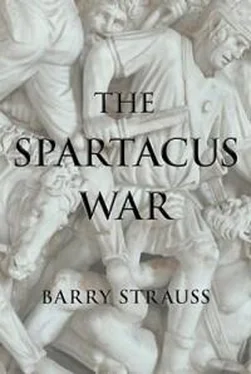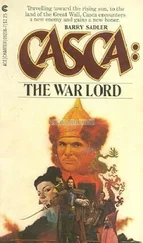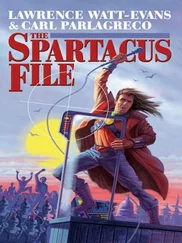But the Romans had a lot more on their minds than Spartacus. In 73 BC Rome was a city of scars. Italy was a peninsula divided between Rome and its often unwilling allies. Over the centuries Rome had conquered Italy’s hodgepodge of peoples, including Greeks, Etruscans, Samnites, Lucanians and Bruttians. Many tensions existed, and two decades earlier they had exploded into a rebellion (91-88 BC). The Italian War (also called the Social War, that is, war of the socii, Latin for allies) took three years of bloody battles and sieges before Rome restored peace, and only at the price of granting citizenship to all the allies. Especially in the south, some Italians remained bitter and unreconstructed. The Italian War was followed by a civil war between the supporters of Sulla and the heirs of his late rival, Marius. Sulla won and served as dictator, but after his retirement in 79 BC and death a year later, civil war flared up again in 77 BC. Italy was at peace in 73 BC but stripped of legions, should trouble break out anew: they had been sent abroad to fight Rome’s many enemies.
The Italian countryside included a large population of slaves, who often ran away and who sometimes rose in armed rebellion. In 73 BC Roman Italy was, in short, a bone-dry forest in a summer heatwave. Spartacus lit a match.
Chapter 1 — The Gladiator
Spartacus was a heavyweight gladiator called murmillo [2] Florus, Epitome 2.8.12.
. A man ‘of enormous strength and spirit’ [3] Sallust, Histories frg. 3.90.
, as the sources say, he was about thirty years old. Murmillones were big men who carried 35- 40 pounds of arms and armour in the arena. They fought barefoot and bare-chested, rendering all the more visible the tattoos with which Thracians like Spartacus proudly embellished their bodies. Murmillones each wore a bronze helmet, a belted loincloth and various arm- and leg-guards. They carried a big, oblong shield (scutum) and wielded a sword with a broad, straight blade, about a foot and a half long. Called the gladius, it was the classic weapon of the gladiator. It was also the standard weapon of a Roman legionary.
Although we know nothing of Spartacus’s record in the arena, we can imagine him locked in combat one afternoon. Fans that they were, the Romans have left masses of evidence about the games, and recent historical reconstructions enrich the picture. We know, for example, that Spartacus would have fought just one other man at a time, despite Hollywood’s image of mass fights. Real gladiators fought in pairs, carefully chosen to make an exciting contest - but not a long life for the contestants.
A murmillo like Spartacus never fought another murmillo; instead, he was usually paired with a thraex. Thraex means ‘Thracian’, but Spartacus did not represent his country in the arena, perhaps because his owner feared stirring up his slave’s national pride. The thraex was also a heavyweight but he had to be quicker and more agile. His arms and armour were similar to the murmillo’s but the thraex carried a small shield (parmula) that made him lighter and more mobile. And the thraex carried a curved sword (sica), like the one used by Thracians in battle.
Gladiatorial matches usually began with a warm-up with wooden weapons. Then the ‘sharp iron’ [4] ferra acuta; see Marcus Junkelmann, ‘Familia Gladiatoria: The Heroes of the Amphitheatre’, in Gladiators and Caesars: The Power of Spectacle in Ancient Rome, Eckart Koehne and Cornelia Ewigleben, eds., English version ed. R. Jackson (Berkeley: University of California Press, 2000), 66.
arms were brought in and tested to make sure they were razor-sharp. Meanwhile, Spartacus and his opponent prepared to die - but not by hailing the sponsor of the games. The famous cry, ‘Those who are about to die salute you!’ was, as far as we know, a rare - and later - exception. Instead, a match usually began with a signal from the tibia, a wind instrument like an oboe.
The contest unfolded with a combination of elegance and brutality. Gladiators attacked but rarely crossed swords, since their blades were too short. Instead, they thrust and parried with their shields, pushing an opponent back, drawing him forward, or - with the shield turned horizontally - hit him with the edge. The crash and boom of shields, rather than the metallic clank of swords, marked the sound of combat.
With his 15-pound scutum, a strong murmillo could hit harder, but a fast thraex could get in more blows in rapid succession with his 7-pound parmula. Knowing how much damage the curved sword of the thraex could do, Spartacus guarded his flank. Instead, he tried to keep the battle on a vertical axis, constantly standing with his left shoulder and left leg forward, thereby denying his foe an opening while keeping up the pressure. He held his shield close to his body to prevent the thraex from rapping at it with his parmula and destabilizing it. Every now and then Spartacus would bring his shield forward in a sudden, powerful thrust to shift the thraex off balance.
Denied Spartacus’s flank, meanwhile, the thraex might have ducked and lunged at Spartacus’s unprotected right leg. He might even have attempted the more difficult move of leaping up, powering his right arm over the top of Spartacus’s shield and stabbing him with his curved sica. If these murderous manoeuvres failed, however, they would have given Spartacus a sudden opening. The smart move for Spartacus would have been to feint, thereby tempting the thraex into thrusting towards him - only to find Spartacus ready to parry and deliver a deadly riposte.
Every so often during a fight a glancing blow got through, leaving a man bleeding but not fatally wounded. Pumped up on adrenaline, he would have to keep fighting, however bruised, tired and sweating, all the while continuing to think on his feet, always shifting tactics. Although it appears that most bouts lasted only ten to fifteen minutes, there was no time limit; the fight went on until one man won. Meanwhile, each fighter had to close his mind to the noises of the crowd and the brass instruments accompanying the match and focus solely on combat. He also had to try somehow to keep the rules in mind. Gladiatorial bouts were no free-for-alls. A referee (summa rudis) and his assistant (secunda rudis) enforced the regulations. The most important rule was for a fighter to back off after wounding an opponent.
Let us imagine that Spartacus had driven his enemy off balance, knocked the man’s shield out of his hand, and stabbed him in the arm. Spartacus would then withdraw from the wounded man. Whether to finish off the thraex was not up to a gladiator or referee; it was up to the producer (editor).
The producer, in turn, usually asked the audience. A decision about a fallen fighter was the moment of truth. If the crowd liked the losing gladiator and thought he had fought well, they would call for letting him go. But if they thought the loser deserved to die, they wouldn’t be shy about shouting, ‘Kill him!’ They made a gesture with their thumbs, but it was the opposite of what we think today: thumbs up meant death.
In that case, the loser was expected to kneel - if his wounds allowed - while the winner delivered the death blow. At the moment that the loser ‘took the iron’, as the saying went, the crowd would shout, ‘He has it!’ The corpse would be carried away on a stretcher to the morgue. There, he had his throat cut as a precaution against a rigged defeat. Burial followed.
Spartacus, meanwhile, would climb the winner’s platform to receive his prizes: a sum of money and a palm branch. Although a slave, he was allowed to keep the money. After climbing down from the podium, he would wave the palm branch around the arena as he circled it, running a victory lap, taking in the crowd’s approval.
Читать дальше












